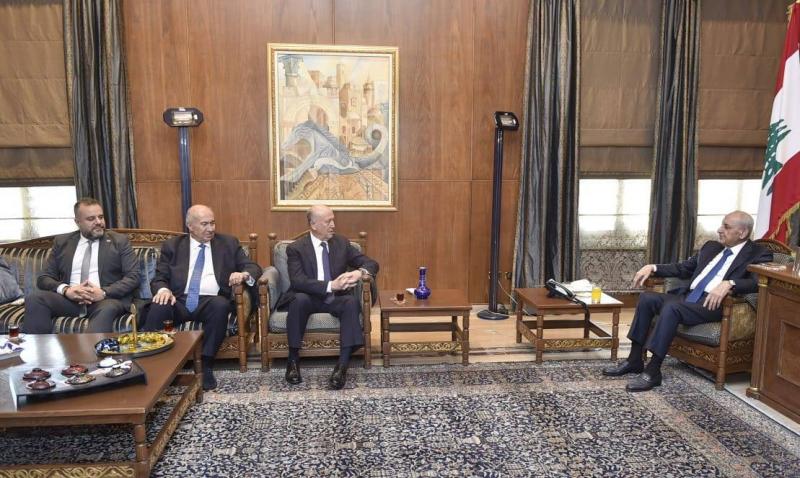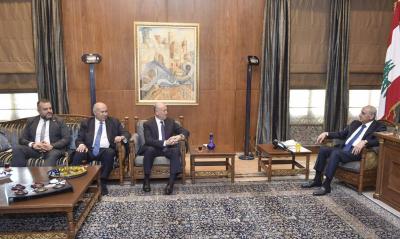Lebanon's Parliament Speaker Nabih Berri received a delegation from the "Tajaddod" parliamentary bloc today, Monday, at the second presidential residency in Ain al-Tineh. The delegation included MPs Fouad Makzoum, General Ashraf Rifi, and Adeb Abdul-Masih. After the meeting, MP Fouad Makzoum stated: “After a series of meetings with religious authorities that we have visited and are preparing to continue with other spiritual and political references, the 'Tajaddod' bloc met president Berri today to maintain communication with everyone, considering him as the head of the legislative authority which is the oldest elected institution by the Lebanese people and has a significant responsibility in protecting Lebanon amid the serious events occurring in the region and Lebanon."
Makzoum added, “We confirm the candid atmosphere that prevailed during the meeting, and the bloc considered that President Berri's constant emphasis on Lebanon being under the framework of international legitimacy is the natural and necessary position to prevent Lebanon from bearing the consequences of the war. From this standpoint, we believe that emphasizing the umbrella of international legitimacy resolutions, specifically Resolution 1701, requires the complete application of this resolution in all its articles, and there is no room for interpretation. The Lebanese army, in coordination with international peacekeeping forces, must take responsibility for controlling the borders and restoring the state's sovereign decision, which ensures Lebanon’s protection from the risks of war and destruction.”
Furthermore, he stated, "Here we reaffirm our full support for the Palestinian people's cause, rejecting the assaults on Gaza and the West Bank that have resulted in a humanitarian catastrophe. We consider that the Arab resolution adopted by the United Nations represents a significant step toward ending the suffering in Gaza, and we call on the international community to take immediate action to stop these aggressions and tragedies and to resume the peace process to restore the Palestinian national rights, foremost among which is the establishment of an independent state according to the two-state solution, as set by the Arab summit in Beirut in 2002."
He added, "What is happening in Gaza should not turn in Lebanon into a reason for division among the Lebanese. The 'Tajaddod' bloc seeks to play a unifying role that establishes a safety network capable of protecting Lebanon, as we believe that restoring the state’s sovereign decision, adhering to the constitution and international legitimacy decisions, and maintaining Lebanon’s Arab and international relations is the only and fastest way to prevent risks of a war that Lebanon will not be able to bear the humanitarian and economic consequences of. We emphasize that protecting Lebanon requires today, before tomorrow, the election of a new president. This necessitates the parliament to fulfill its role by scheduling open sessions to meet this entitlement and for the council to translate this duty into electing a president of the republic, especially since we are in the darkest and most dangerous phase in Lebanon’s history."
Makzoum noted that, "We hope and work for this communication with President Nabih Berri to serve as an entrance to restore the work of constitutional institutions, especially as there is a presidential vacancy, and the government lacks the confidence of the elected parliamentary council, indicating a lack of readiness to confront the rapidly evolving developments in the region.”
He concluded, "The bloc will continue its ongoing efforts with all parties, within the vision it adopts aimed at achieving the interest of Lebanon and the Lebanese, which can only be realized with the presence of an effective state that fulfills its roles and responsibilities to the fullest."
In the afternoon, President Berri discussed the latest developments and the general situation in Lebanon and the region, due to the escalation of Israeli aggression against the Gaza Strip and Lebanese border villages with occupied Palestine, during his meeting with former Foreign Minister Fares Boueiz, who stated after the meeting: "In this difficult and dangerous historical context, and given the fear of the conflict and war expanding, it was essential for us to meet with President Nabih Berri to gain insight from him and get updates, and to express our viewpoint that this war could indeed expand and could include Lebanon. We must be prepared for civilian resilience; the government must take all necessary measures to establish certain frameworks to protect the country from losing medications, to protect hospitals and food and oil supplies, and also to anticipate any possible paralysis of government operations, God forbid. Therefore, the government should ensure all necessary measures to provide sensitive ministries with a minimum budget that allows them to intervene in case of extreme situations."
Boueiz added, "I think President Berri is aware of this situation, and this is his opinion he communicated to the Prime Minister a few days ago. I hope the government and the parliamentary council will take all the necessary measures to organize any exceptional situation that may arise in the country."
He concluded, "The Zionist project is not just a war; it is a project to end the Palestinian cause and a plan to displace more than two million Palestinians from Gaza, finalizing the Palestinian state file, which is what Netanyahu seeks. This is something we must take into consideration; we truly do not know how things will develop. We do not know if Netanyahu will provoke Lebanon and the resistance, nor do we know how much this conflict will expand. If this government lacks the capacity to change the situation, at the very least, it should prepare to organize internal conditions and anticipate what could happen on all levels."
Additionally, President Berri met with the Russian ambassador to Lebanon, Alexander Rudakov, where the general situation in Lebanon and the region was discussed in light of the escalating Israeli aggression on the Gaza Strip.




